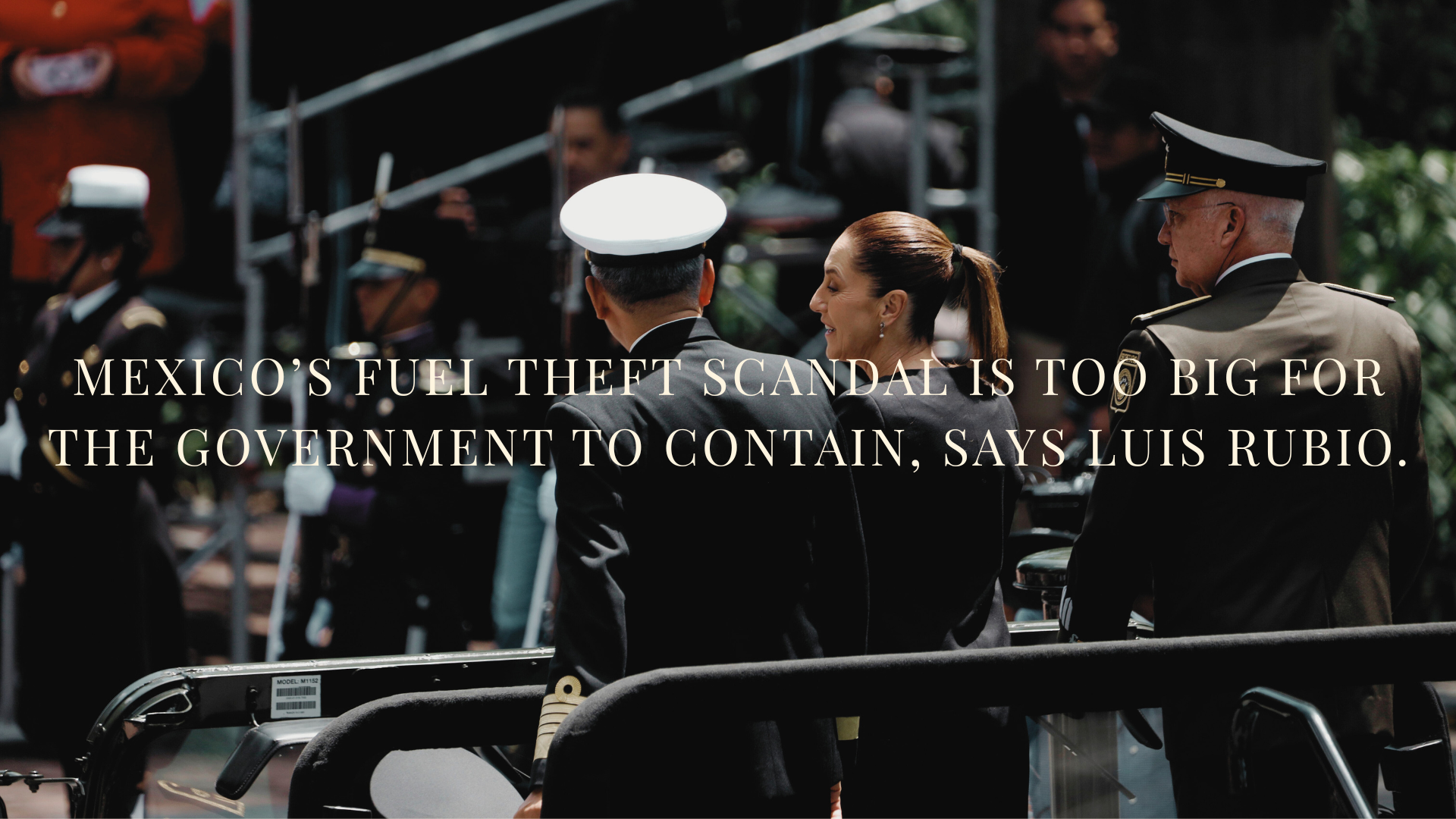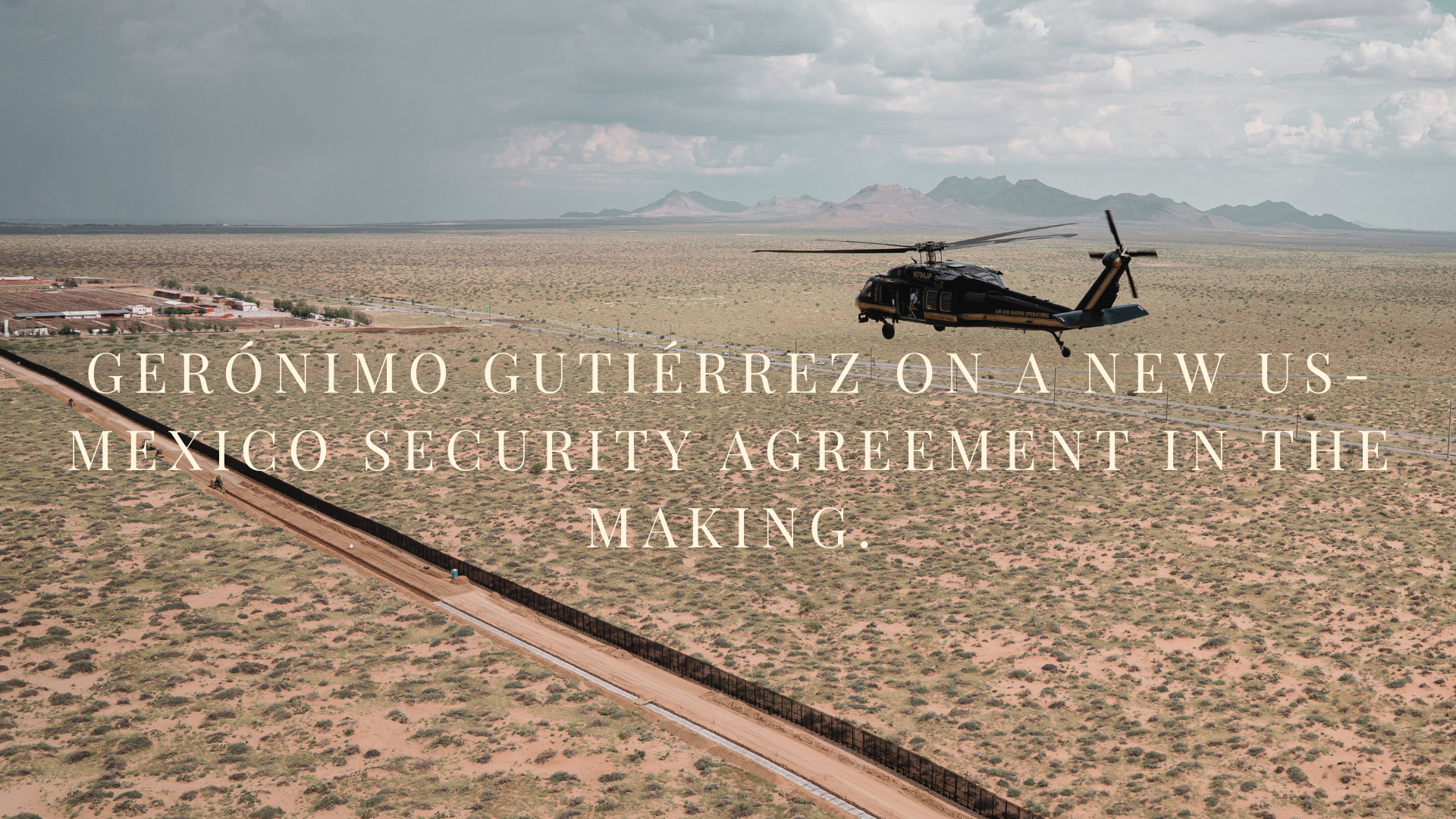
Trump’s drug war isn’t adding up
by Andrew Law, editor and founder.
I want to pause this week to point out an incongruity in the Trump administration’s supposed war on drug trafficking that is posing challenges around how we best cover this key topic. This isn’t my usual kind of column, but I hope you’ll bear with me.
The press — and I think most people generally on both sides of the border — see Trump as having gone hard on traffickers. The militarized southern border, the arm-twisting of Sheinbaum and her MORENA allies, downgrading Colombia, and of course, the bombing of passenger boats in the Caribbean. Last week, I highlighted rumors that the fuel theft scandal engulfing Mexico’s Navy (and discussed in more detail this week by Luis Rubio) is being propelled by leaks out of Washington. It all gives the impression of a major realignment of US security posture. But when you zoom in, it just doesn’t hang together…

Mexico’s fuel theft scandal is too big for the government to contain
by Luis Rubio.
Gasoline theft is nothing new in Mexico. One need only recall the 1992 Guadalajara explosion, triggered by stolen gasoline dumped into the city’s drainage system after traffickers failed to sell their cargo during Holy Week. That was just the beginning, in fact, child’s play. Since then, two factors have changed: first, the sheer scale of the stolen-fuel market; and second, the deep entanglement between organized crime and government officials. The central question now is whether the sheer magnitude of this scandal—both in financial terms and in the corruption it exposes—will have significant political consequences.
Today, fuel theft in Mexico takes three forms. The first is the direct siphoning of gasoline from Pemex pipelines, most notably in Guanajuato, a hub crisscrossed by pipelines. The second is crude oil theft, followed by clandestine refining. The third, and most lucrative, is so-called tax-huachicol: gasoline imported but disguised on paper as crude oil to avoid paying taxes. A variation of this scheme involves exporting illegally refined gasoline to the United States, also tax-free, a trade with quite different, in fact geopolitical, implications, beyond the obvious criminal ones.
Illegal fuel sales have…

A new US - Mexico security agreement in the making
by Gerónimo Gutiérrez. Ambassador Gutiérrez served as Mexico’s Ambassador to the United States and as Mexico’s Deputy Secretary for Governance and Homeland Security.
—
Last week tensions between the US and Mexico governments surfaced again. President Sheinbaum denied the existence of an agreement between the Drug Enforcement Agency and the Mexican government. Her comments were directed towards a press release from the DEA announcing the launch of a “bold bilateral initiative to dismantle cartel gatekeepers and combat synthetic drug trafficking”. In my view, the rebuttal appears to be more the result of miscommunication than of the lack of willingness on both sides to strengthen cooperation. In fact, Sheinbaum confirmed that some form of security agreement is in the making and could be formalized in the next few weeks during a visit to Mexico of Secretary of State Marco Rubio. This was overlooked and could potentially be good news. Here are four takeaways of last week’s episode…

These are Mexico’s five new public security laws, and this is what they do
by Alexandra Helfgott.
President Claudia Sheinbaum has accelerated the momentum initiated by her predecessor to overhaul Mexico’s approach to public security. Her administration has pursued a strategic transformation of the country’s security framework. While these laws are framed as tools for enhancing transparency and accountability, critics argue they threaten the rule of law and civil liberties.
This shift began under President Andrés Manuel López Obrador (AMLO), who in 2019 created the National Guard, a civilian force meant to replace military deployments following the 2006 launch of the War on Drugs. AMLO and allies described the Guard as a temporary force crucial to restoring accountability in security efforts. However, the Guard’s role quickly expanded, taking over customs and border control, infrastructure projects like Tren Maya, and migration enforcement. It evolved into a central pillar of Mexico’s security strategy. Just before leaving office, Congress approved a constitutional reform placing the Guard under military control (Sedena), following a failed 2023 attempt blocked by the Supreme Court.
Less than a year into office, Sheinbaum has embraced continuity, introducing over 20 bills in an extraordinary congressional session. Several of these will significantly alter public security policy, sparking concerns about increasing surveillance and militarization.
These are the five new laws and reforms that will fundamentally transform Mexico’s national security approach…

Mexico’s government is using the disappeared to build a surveillance state, families say
by Madeleine Wattenbarger.
A polemical point of the reform to the General Disappearance Law passed by Mexican legislators this week is the use of a biometric CURP to search for missing people. The reform is part of a broad legislative package that includes a reform to the General Population Law, which establishes the use of a CURP with fingerprints and a photograph as an identification document obligatory for access to public and private services. The data will go into a Unified Identity Platform (PUI, by its initials in Spanish), which will, in theory, permit the authorities to locate missing people by their CURP.
A previous iteration of the biometric CURP proposal was backed by the World Bank, and similar initiatives were proposed by Felipe Calderón, Enrique Peña Nieto and former Secretary of the Interior Olga Sanchez Cordero. The reform comes out of a proposal presented by Claudia Sheinbaum on March 27, after disappearances in Mexico were thrown into the spotlight: search collectives found a ranch in Teuchitlán, Jalisco, where victims of forced recruitment were held, and the United Nations Committee on Forced Disappearance gave the official assessment that systematic state disappearances exist in Mexico.
After Sheinbaum presented the reform to the General Disappearance Law, the government held a series of feedback sessions with search collectives and victims’ families. Some of the families’ proposals appear in the revised law passed by the Senate. It will incorporate…

Mexico’s new security laws expand military power and erode civilian oversight
The final stage of the National Guard’s militarization is now underway.
In September 2024, former President López Obrador amended the Constitution to formally place the National Guard—already operating in practice as a military force—under the control of the Ministry of Defense. Last week, Congress convened an extraordinary session to approve legal reforms introduced by President Claudia Sheinbaum. These reforms aim to align at least nine existing laws with the 2024 constitutional amendment and complete the transformation of the National Guard into the fourth branch of the armed forces. These secondary laws mark the culmination of the process initiated by López Obrador and underscore that Morena’s priorities remain unchanged.
Throughout its electoral victories, Morena has made clear its conviction that the military should play a prevalent role in public life. The secondary legislation has further entrenched this vision, and the concern lies not merely in the specific laws being passed, but in the broader ambition to forge a new political regime defined by the primacy of military authority. In liberal democracies, the military sphere is deliberately constrained; in illiberal regimes, it is expanded.
Before the 2024 reform, the Constitution stated that in times of peace, the military could not perform any activities other than those strictly related to military discipline. The constitutional reform changed this, allowing the armed forces to carry out any function established by secondary law. This is a significant shift which opens up many new possibilities for what the armed forces are allowed to do.
For example, the amendments submitted to the legislature expand the powers of this body, authorizing it, among other things, to intercept private communications and carry out undercover operations. This move comes alongside…


Amid international fallout, a local tragedy
by Madeleine Wattenbarger.
Until last week, Ximena Guzmán Cuevas and José Muñoz were not public figures. Longstanding members of the ruling Morena Party, they both held senior positions in Mexico City’s government. Guzmán worked as Mayor Clara Brugada’s personal secretary; Muñoz as an adviser, coordinating closely with the national government, including on security issues. On Tuesday, May 20, a little after 7 a.m., Guzmán pulled over on a busy stretch of Tlalpan Avenue to pick up her coworker. A gunman fired twelve shots into the car, killing both Ximena and Pepe.
The assassination was timed for maximum visibility: up the road, in the National Palace and in view of the press, Security Secretary Omar García Harfuch informed President Sheinbaum of the events. She announced the news live to the nation.
A week later, information is scarce and the suspects remain at large. At a press conference the day after the murders, Mexico City’s top prosecutor, Bertha Alcalde Luján, and Public Security Secretary Pablo Vázquez Camacho refrained from answering questions about possible motives. The location, timing, and calculated execution suggest a professional hit: the assassins worked in a trio, used gloves to avoid leaving fingerprints, and escaped in a stolen car into the eastern fringes of Mexico State.

How Mexico disappears the missing
by Emiliano Polo.
Mother’s Day in Mexico has increasingly become a day of protest for women whose children have disappeared in the context of a deepening national crisis. This year, demonstrations in cities such as Mexico City and Guadalajara on May 10 demanded both recognition for the search efforts undertaken by families and guarantees for their safety, particularly in light of the growing number of searchers who have been murdered. These protests stressed a disturbing pattern: those who step in to do the work the state has failed to carry out are now being targeted themselves. In reclaiming public space and visibility, these women not only confront institutional abandonment but also redefine courage as a form of political resistance towards a government that promotes impunity to hide its incapacity.
Behind the more visible violence of organized crime and drug trafficking in Mexico lies a more profound, less acknowledged crisis. While homicides and cartel-related violence dominate headlines, the fate of over 125,287 missing persons—according to the Ministry of the Interior’s registry—remains unknown. The impunity around the tragedy results from both deliberate government action and inaction.
The Mexican government has thoroughly undermined its own capacity to respond to this crisis by slashing budgets, weakening judicial and investigative institutions, and manipulating official databases to obscure the exact scale of the missing persons crisis. The Office of the Attorney General, for example, has ignored its legal responsibilities, particularly in identifying the thousands of bodies buried in clandestine graves and in establishing a comprehensive National Program of Exhumations.

Baja California’s Governor loses US visa
by David Agren.
When US President Donald Trump alleged an “intolerable alliance” between drug cartels and the government of Mexico - made as he first unveiled tariffs on the country in January - Mexican President Claudia Sheinbaum bitterly objected.
She branded the claims “slander,” and shone a spotlight back on the US. “If there’s a place that such an alliance exists it’s with US gunmakers, which sell high-power weapons to these criminal groups,” she said.
Sheinbaum later showed White House evidence for its narco-alliance claim, which featured a news story on former public security secretary Genaro García Luna – a common foil for Sheinbaum and her ruling Morena Party – being convicted in a US court of taking bribes from the Sinaloa Cartel. She used the White House including his case as proof that drug-cartel collusion was a thing of the past.

Morena reacts furiously to UN probe into forced disappearances
by Andrew Law.
“There is no forced disappearance in Mexico.”
That was the response from Mexico’s President, Claudia Sheinbaum, to news that the UN plans to investigate forced disappearances in the country. More than 124,000 people have disappeared in Mexico.
Sheinbaum’s claim was quickly supported by her Morena Party. Party members in the Senate passed a motion saying the government had no role in the crisis.
But last Friday, the UN Committee on Enforced Disappearances announced it would launch a formal investigation. Committee President Olivier de Frouville said the inquiry was based on three Articles of the International Convention for the Protection of All Persons. According to El Financiero, he made it clear that this “in no way prejudges the Mexican state.” Still, de Frouville added, “We have received information that… provides sufficient grounds to support the belief that enforced disappearances are practiced on a widespread or systemic basis.”

